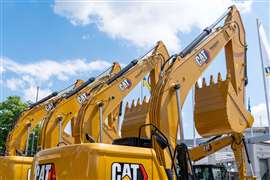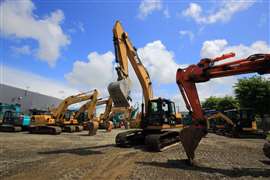European rental sector reports dampening confidence
12 October 2012
The dampening in confidence levels in Europe’s rental sector evident since the summer of 2011 – linked to the Eurozone debt issue – continued in the third quarter of 2012 with an increasing proportion of companies reporting worsening conditions, according to the latest ERA/IRN RentalTracker survey.
At the end of September almost 42% of respondents reported a deteriorating business environment, and the negative balance of opinion (the difference between the numbers seeing worsening rather than improving conditions) increased to -20.8% from -17.5% in the previous quarter. That’s the worst negative balance of opinion since the second quarter of 2009, although the business context is quite different.
The results come from the ERA/IRN RentalTracker survey for the third quarter of 2012. Almost 200 companies in Europe completed the survey in the final two weeks of September and the first week of October. The survey is a joint venture between International Rental News magazine and the European Rental Association (ERA).
In terms of quarterly levels of activity – which relates to revenue levels - there was little change from the first and second quarters of 2012, with a small positive balance of opinion. That is, more people were reporting year-on-year increases in revenues for the third quarter than were reporting decreases.
A healthy 72% reported similar or higher levels of activity in the third quarter of 2012 compared to a year ago. Just over a quarter reported lower business levels compared to a year ago.
A similar pattern is evident for the first nine months of the year, with a positive +13.8% balance of opinion on activity levels, which is exactly the same as in the second quarter. This would support the ERA’s current projections for a modest increase in rental revenues for Europe this year. Essentially, 2012 looks like it will be flat in terms of revenue growth for many companies.
Capital investment
The softening confidence in Europe as a whole has had an impact on capital investment intentions. Looking at 2012 first, the proportion expecting to increase spending by more than 10% this year fell slightly to 25% from 27% in the second quarter and 35% in the first.
Clearly, the confidence to invest reduced as the year has progressed. The proportion expecting to cut investment by more than 10% this year increased to 25% from 20% in Q2, again reflecting a hardening of views. Exactly a half of respondents said spending in 2012 would be the same as in 2011.
Of more interest now are the spending forecasts for 2013. Again, caution is having a significant impact. At the end of March 2012 almost 40% of respondents were planning significant increases in spending in 2013: that figure had fallen to 21% at the end of the third quarter.
Just as significant, 28% said they will cut spending by more than 10% next year, which means that there is a negative balance of opinion on spending of -7%. While 50% say they will spend the same as in 2012, there are now more people planning to reduce spending than increase it.
Still, this does not represent a disaster for manufacturers. It is important to note that more than seven out of every ten rental company in the survey will maintain or increase spending levels in 2013 compared to 2012.
Utilisation
Time utilisation is of course a major factor in measuring the rental business environment, and here there was a slight improvement on the second quarter. Although the positive balance of opinion was the same at +7.3% (that is, more rental companies are reporting improving utilisation rather than lower rates), the proportion seeing year-on-year improving utilisation rose to 34.1%. The same figure in the second quarter was 30.9%. A further 39% were seeing constant time utilisation levels.
The big increases in time utilisations reported in 2010 and the first half of 2011 are behind us, with the over-fleeting of 2009 and early 2010 now corrected and fleet sizes now still only increasing modestly, if at all.
Employment Intentions
There is little change in employment intentions in the third quarter survey. The majority – 59% - will not add or reduce staffing levels in the final quarter of 2012, and the proportion expecting to add staff, around 25%, has been the same for three quarters in a row.
There has, however, been an increase in the proportion expecting to reduce employment in the next quarter, from 11.4% in the second quarter to 17.1% now.
There is still a positive balance of opinion on employments intentions, although at +7.2% it is at its lowest since the employment question was first asked in early 2010.
Future expectations
We ask companies on their projections for activity levels 12 months from now. The results for the third quarter survey show that there is still a reasonable number expecting the environment to be better – almost 35% - but the numbers expecting a decline in business has gone up to 30.7%.
The ‘decline’ figure has risen steadily since the final quarter of 2011, when just 16.9% were expecting things to be worse a year in advance. There remains a positive balance of opinion on this – just +3.9% - but that compares to +30.9% as recent as March of this year.
Although rental companies in Europe are becoming less optimistic about future prospects it should be borne in mind that still almost 70% are expecting no deterioration in business levels for 2013.
Regional trends
It is clear that Europe currently masks wide variations in economic performance, with Spain, Italy, Portugal and Greece in quite different places from Germany, the Nordic nations and Russia, and with the UK and France somewhere in between.
This is supported by the results of the survey, although we did not receive enough responses from Germany and Italy to provide any meaningful findings.
Companies in Russia and the Nordic region are the most likely to increase their CapEx in 2013 and the least likely to reduce spending. By the same token, companies in Spain, the UK and Ireland and France are the most likely to reduce their spending in 2013. Not one French company who responded to the survey said they would increase spending by more than 10% in 2013.
As regards current business conditions (that is, at the end of September 2012) Nordic countries are the most positive followed by Russia, with all the others having significant negative balances of opinion. Multinational companies, who have been more robust in previous quarters, were the most downbeat on current conditions, with a negative balance of -53%.
Utilisation rates still seem to be improving in the Nordic region and Russia, and rental companies in the UK and Ireland were also positive here, with half reporting rising time utilisation.
Nordic and Russian companies are also the most optimistic about 2013, with 70% or more in both cases expecting higher business levels. While 35% of all the respondents expected improvements in 2013, companies in the UK and Ireland are more optimistic than the average, with 50% forecasting higher levels of activity. This probably reflects the fact that the UK’s economy has been in mild recession this year and there is a wide expectation that it won’t be worse next year.
See the Nov-Dec issue of IRN for further analysis of the survey.






